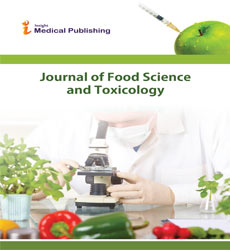Application of Agrochemicals in Agriculture: Benefits, Risks and Responsibility of Stakeholders
Department of Botany, Government Degree College Naguman Peshawar, Peshawar, Pakistan
- *Corresponding Author:
- Abdul Majeed
Department of Botany
Government Degree College
Naguman Peshawar, Peshawar, Pakistan
E-mail: majeedpsh@gmail.com
Received date: January 29, 2018; Accepted date: January 29, 2018; Published date: February 05, 2018
Citation: Majeed A (2018) Application of Agrochemicals in Agriculture: Benefits, Risks and Responsibility of Stakeholders. J Food Sci Toxicol. Vol.2 No.1.1
Introduction
Increasing demand for food supply due to rapid growth in human population has triggered agricultural intensification during the last few decades. For addressing the growing food demands, agrochemicals (fertilizers and diverse pesticides) are rigorously used in agriculture which accomplishes the gap between food production and consumption; however, concurrently unbalanced use of agrochemicals also cause environmental deterioration and pose severe challenges to aquatic and terrestrial ecosystems. Since sustainability of ecosystem, environment and agricultural is the prime focus of scientists and researchers, reduced throughputs of such chemicals are crucially required by employing eco-sustainable measures. To attain maximum agricultural output, there is an urgent need for cautious use of natural resources and minimal application of hazardous compounds in agriculture which are supposed to offer potential challenges to our natural agroecosystem.
Benefits and Associated Risks
Application of pesticides and fertilizers in agriculture has several benefits which range from yield increase of agricultural crops and soil fertility to pest management and crop protection. Cultivated crops are challenged with several biotic (weed, insect and pest infestation) and abiotic stresses (reduced soil fertility) which are managed by extensive use of fertilizers and pesticide. The application of these agrochemicals has resulted in increased soil fertility and insect/pest management with consequent yields of crops during the last 40 years [1]. Studies indicate that fertilizers and pesticide use in agriculture have been substantially increased both in developed and developing countries in recent years for attaining maximum yields of crops [2,3]. Nevertheless, there is a growing concern worldwide over the use of synthetic fertilizers and pesticides in agriculture because of their toxicity to human, environment, and ecosystems. Major risks associated with frequent use of pesticides and fertilizers are soil and water pollution, the emergence of resistant strains of weeds and pests to pesticides, ecological instability, and toxicity to the human and other organisms [1,4]. Several reports have outlined that aquatic and terrestrial ecosystems are at emergent risks due to the exhaustive application of fertilizers and pesticide beside their confirmed association with some of the human health disorders like rheumatoid arthritis, kidney diseases, different cancers, etc. [5,6]. It is, therefore, necessary to consider risks and challenges posed by agrochemical application in agriculture for safeguarding human health, ecosystem, and environment.
Responsibilities of Stakeholders
Since production of more food for meeting global food demand of the growing population is one of the key objectives of agro-industries, growers and policymakers for which substantial resources and scientific investigations have been allocated through decades; however, the accomplishment of such objectives at the risk of environment and ecosystem cannot be justified. While making efforts to produce more food by the application of agrochemicals, issues concerned with human health, environment and ecosystem must be taken into consideration [7]. Keeping in view the long-term effects of agrochemicals on environment and ecosystem, policymakers can play a vibrant role in regulations to minimize the use of these chemicals in agriculture. Growers need to adopt crop rotation practices, use of natural fertilizers and integrated disease management strategies which can work better in reducing reliance on conventional fertilizers and pesticides [8]. Agrochemical industries represent one of the key stakeholders and hence they have more shares of responsibilities to introduce less toxic and hazardous chemicals. Alternative measures for development and commercialization of bio-fertilizers and biocontrol agents are attractive strategies. Awareness among farmers and the general public regarding the hazardous effect of agrochemicals is an important factor which can stimulate pressure build up for minimum utilization of conventional agrochemicals.
In summary, it is well established that agrochemical utilization in agriculture has substantially contributed to crop yields and protection from pests. However, in parallel agrochemical application has also noxious effects on human health, ecosystem and environment. It seems impractical to completely abandon the use of conventional fertilizers and pesticides in agriculture; non-conventional approaches can significantly reduce their use and can contribute to saving ecological and environmental sustainability.
References
- Lamichhane JR, Dachbrodt-Saaydeh S, Kudsk P, Messéan A (2016) Toward a reduced reliance on conventional pesticides in European agriculture. Plant Dis 100: 10-24.
- Gellings CW, Parmenter KE (2004) Efficient use and conservation of energy. Energy Efficiency in Fertilizer Production and Use (UNESCO-EOLSS) 2: 123-136.
- Carvalho FP (2017) Pesticides, environment and food safety. Food Energy Sec 6: 48-60.
- Majeed A, Muhammad Z, Ullah Z, Ullah R, Ahmad H (2017) Late blight of potato (Phytophthora infestans) I: Fungicides application and associated challenges. Turk J Agric Food Sci Technol 5: 261-266.
- Jayasumana C, Fonseka S, Fernando A, Jayalath K, Amarasinghe M, et al. (2015) Phosphate fertilizer is a main source of arsenic in areas affected with chronic kidney disease of unknown etiology in Sri Lanka. SpringerPlus 4: 90.
- Parks CG, Hoppin JA, De Roos AJ, Costenbader KH, Alavanja MC, et al. (2016) Rheumatoid arthritis in agricultural health study spouses: Associations with pesticides and other farm exposures. Environ Health Perspect 124: 1728.
- Majeed A (2017) Food toxicity: Contamination sources, health implications and prevention. J Food Sci Toxicol 1: 2.
- Majeed A, Muhammad Z, Ahmad H, Islam S, Ullah Z, et al. (2017) Late blight of potato (Phytophthora infestans) II: Employing integrated approaches in late blight disease management. PSM Biol Res 2: 117-123.
Open Access Journals
- Aquaculture & Veterinary Science
- Chemistry & Chemical Sciences
- Clinical Sciences
- Engineering
- General Science
- Genetics & Molecular Biology
- Health Care & Nursing
- Immunology & Microbiology
- Materials Science
- Mathematics & Physics
- Medical Sciences
- Neurology & Psychiatry
- Oncology & Cancer Science
- Pharmaceutical Sciences
